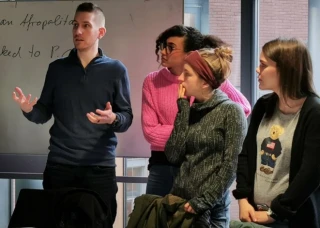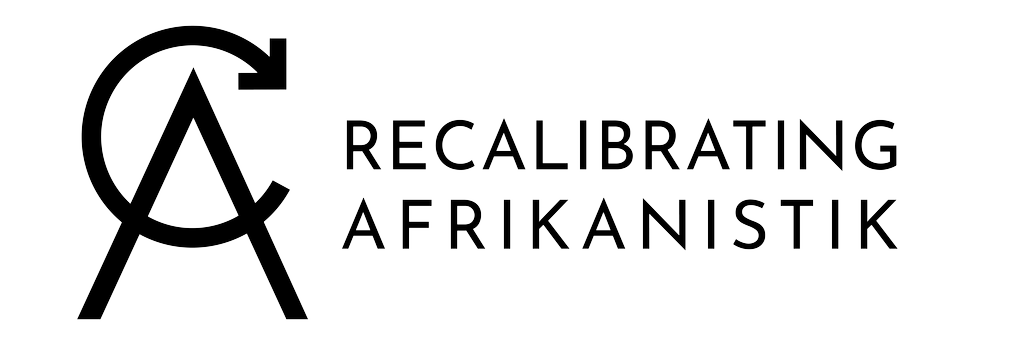RecAf Winter School 2021 in Leipzig
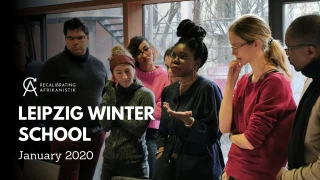
Our first Winter School took place at Leipzig University in January of 2020 with 16 student participants from Cologne, Bayreuth, and Leipzig discussing the topic of “Postcolonial Debates: Politics of Knowledge Practices in and Around African Languages and Literatures“. We had the great opportunity to involve many lecturers from our partnering universities who created an extensive and fascinating program that included a variety of teaching modes. The ten days were filled with (walking) lectures, workshops, discussion rounds, readings, city walks, and film screenings.
After getting to know each other a little bit better on the first day, Rose Marie Beck and Lara Krause (University of Leipzig) led the first session in which we discussed perspectives on language and key terms in Postcolonial Theory, such as subalternity, representation and Southern Theory. Later on, our guest speaker Samuel Ndogo (Moi University) gave a presentation on language in Kenyan stand-up comedy.
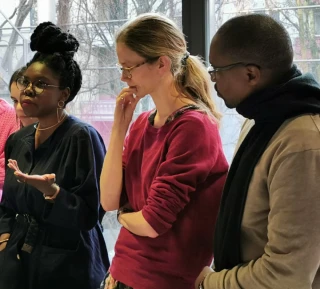
The second day started with a lecture by Dmitri van den Bersselaar (University of Leipzig) on ‘Postcoloniality as Historical Period and as Perspective’. Afterwards, the students got together in groups to look at specific case studies and think about the limits and potentials of postcolonial debates together with Susann Ludwig (University of Leipzig). All breaks in between were spent snacking on cookies and coffee, chatting in the hallways, strolling briefly around Leipzig, or eating hot soup at lunch time. As a special event, the Winter School students got the opportunity to attend the lecture “Decoloniality And Radical Silence in African Studies” by Prof. Elísio Macamo which took place that evening as part of a lecture series on Postcolonial Theory at the University of Leipzig.
The third day of the Winter School was dedicated to the topic of Language and Tourism in the Postcolony. Angelika Mietzer (University of Cologne) had prepared a day of critical reflecting on language as commodity and the linguascapes of tourism, working with various excerpts from movies, such as ‘The White Masai’, as well as the famous paper by Binyavanga Wainaina “How to write about Africa”.
In Clarissa Vierke’s (University of Bayreuth) session on Afropolitanism our seminar tables were transformed into a huge work sheet where the students wrote down their thoughts and then presented them to each other.
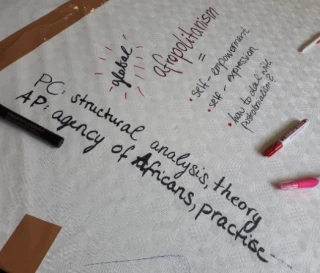
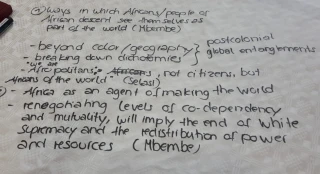
In the afternoon, Brady Blackburn (University of Bayreuth) guided the students to playfully analyse different postcolonial African literary magazines with the help of a game that he had designed himself. A great addition to the program which unleashed everyone’s competitive sides and got quite heated towards the end!
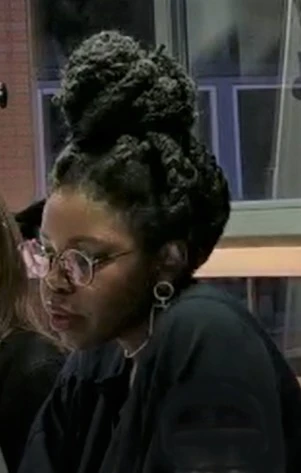
Since two of this year’s participants were creative writers, we hosted a small reading on that evening. Okwiri Oduor, 2014 Caine Prize Winner, read from her short story "My Father's Head" in which she deals with loss and issues of identity.
Dyoniz Kindata performed one of his poems “Tuungane kutokomeza ukatili”, which he wrote, in his own words, “to raise awareness and to cement the idea of equality for both men and women in accessing different societal services, such as education, property ownership and leadership”.
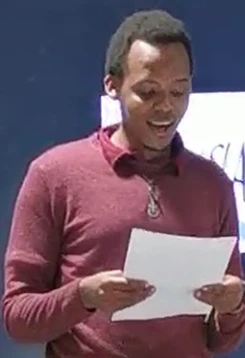
On the fifth day Nikitta Adjirakor (University of Bayreuth) brought us into the world of female voices in spoken word poetry, discussing artists like Koleka Putuma, Lesley Nneka Arimah, and the genre of hip hop. She also kindly shared with us her impressive film “A Thousand Needles”, which she produced in 2018. With an artistic delivery that features her poetry, Nikitta’s documentary touches upon issues of women's sexual and reproductive health and the various ways they can impact women’s lives.
Day six was organised by Irene Brunotti (University of Leipzig) and Serena Talento (University of Bayreuth) with a special focus on Swahili translations, intellectuality, and postcolonial knowledge production. In the afternoon, the students were given the opportunity to work on various literary texts to get an impression of the intricacies in translation studies and the postcolonial issues that arise out of it.
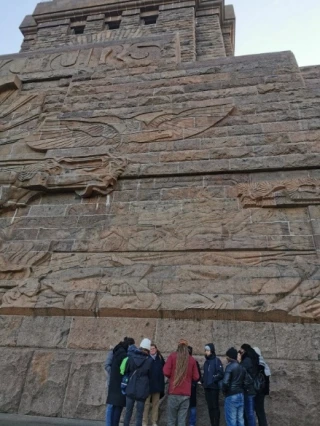
The next day we did not meet in our usual seminar room but at the famous Völkerschlachtdenkmal (Battle of the Nations Monument) in the South-East of Leipzig. Prepared with winter jackets, scarves, and hot tea, we set out on our walking lecture on “Linguistc Heritage as a Burden”, designed by Anne Storch (Cologne University). At various stops throughout the city, we read excerpts of texts to each other, trying to untangle the relations between language, nation, and mother tongue. The last stop was a restaurant in the city centre where we were could warm up and enjoy a well-deserved lunch.

Back in the classroom, Lara Krause (University of Leipzig) presented to us her research on ‘Languaging’ as an alternative perspective on language. With little thought experiments, she pointed the students towards the problems of conventional notions of standard languages.
Towards the end of the second week, the students were encouraged to capture their learning experiences in blog posts, some of which were subsequently published on the RecAf website. On our last day together, some students presented their work in class and we wrapped up the Winter School with a reflection on all that we had learned during the past two weeks and how that could possibly influence us within the discipline in the future.
